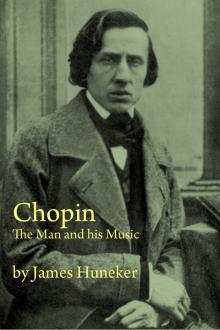Chopin: The Man and His Music by James Huneker (e book reader free TXT) 📖

- Author: James Huneker
- Performer: -
Book online «Chopin: The Man and His Music by James Huneker (e book reader free TXT) 📖». Author James Huneker
(He was shot, a martyr of liberty, at Vienna, November 10, 1848.)
I availed myself of his softened mood to speak to him about his soul. I recalled his thoughts to the piety of his childhood and of his beloved mother. “Yes,” he said, “in order not to offend my mother I would not die without the sacraments, but for my part I do not regard them in the sense that you desire. I understand the blessing of confession in so far as it is the unburdening of a heavy heart into a friendly hand, but not as a sacrament. I am ready to confess to you if you wish it, because I love you, not because I hold it necessary.” Enough: a crowd of anti-religious speeches filled me with terror and care for this elect soul, and I feared nothing more than to be called to be his confessor.
Several months passed with similar conversations, so painful to me, the priest and the sincere friend. Yet I clung to the conviction that the grace of God would obtain the victory over this rebellious soul, even if I knew not how. After all my exertions, prayer remained my only refuge.
On the evening of October 12 I had with my brethren retired to pray for a change in Chopin’s mind, when I was summoned by orders of the physician, in fear that he would not live through the night. I hastened to him. He pressed my hand, but bade me at once to depart, while he assured me he loved me much, but did not wish to speak to me.
Imagine, if you can, what a night I passed! Next day was the 13th, the day of St. Edward, the patron of my poor brother. I said mass for the repose of his soul and prayed for Chopin’s soul. “My God,” I cried, “if the soul of my brother Edward is pleasing to thee, give me, this day, the soul of Frederic.”
In double distress I then went to the melancholy abode of our poor sick man.
I found him at breakfast, which was served as carefully as ever, and after he had asked me to partake I said: “My friend, today is the name day of my poor brother.” “Oh, do not let us speak of it!” he cried. “Dearest friend,” I continued, “you must give me something for my brother’s name day.” “What shall I give you?” “Your soul.” “Ah! I understand. Here it is; take it!”
At these words unspeakable joy and anguish seized me. What should I say to him? What should I do to restore his faith, how not to lose instead of saving this beloved soul? How should I begin to bring it back to God? I flung myself on my knees, and after a moment of collecting my thoughts I cried in the depths of my heart, “Draw it to Thee, Thyself, my God!”
Without saying a word I held out to our dear invalid the crucifix. Rays of divine light, flames of divine fire, streamed, I might say, visibly from the figure of the crucified Saviour, and at once illumined the soul and kindled the heart of Chopin. Burning tears streamed from his eyes. His faith was once more revived, and with unspeakable fervor he made his confession and received the Holy Supper. After the blessed Viaticum, penetrated by the heavenly consecration which the sacraments pour forth on pious souls, he asked for Extreme Unction. He wished to pay lavishly the sacristan who accompanied me, and when I remarked that the sum presented by him was twenty times too much he replied, “Oh, no, for what I have received is beyond price.”
From this hour he was a saint. The death struggle began and lasted four days. Patience, trust in God, even joyful confidence, never left him, in spite of all his sufferings, till the last breath. He was really happy, and called himself happy. In the midst of the sharpest sufferings he expressed only ecstatic joy, touching love of God, thankfulness that I had led him back to God, contempt of the world and its good, and a wish for a speedy death.
He blessed his friends, and when, after an apparently last crisis, he saw himself surrounded by the crowd that day and night filled his chamber, he asked me, “Why do they not pray?”
At these words all fell on their knees, and even the Protestants joined in the litanies and prayers for the dying.
Day and night he held my hand, and would not let me leave him.
“No, you will not leave me at the last moment,” he said, and leaned on my breast as a little child in a moment of danger hides itself in its mother’s breast.
Soon he called upon Jesus and Mary, with a fervor that reached to heaven; soon he kissed the crucifix in an excess of faith, hope and love. He made the most touching utterances. “I love God and man,” he said. “I am happy so to die; do not weep, my sister. My friends, do not weep. I am happy. I feel that I am dying. Farewell, pray for me!”
Exhausted by deathly convulsions he said to the physicians, “Let me die. Do not keep me longer in this world of exile. Let me die; why do you prolong my life when I have renounced all things and God has enlightened my soul? God calls me; why do you keep me back?”
Another time he said, “O lovely science, that only lets one suffer longer! Could it give me back my strength, qualify me to do any good, to make any sacrifice—but a life of fainting, of grief, of pain to all who love me, to prolong such a life—
O lovely science!”
Then he said again: “You let me suffer cruelly. Perhaps you have erred about my sickness. But God errs not. He punishes me, and I bless him therefor. Oh, how good is God to punish me here below! Oh, how good God is!”
His usual language was always elegant, with well chosen words, but at last to express all his thankfulness and, at the same time, all the misery of those who die unreconciled to God, he cried, “Without you I should have croaked (krepiren) like a pig.”
While dying he still called on the names of Jesus, Mary, Joseph, kissed the crucifix and pressed it to his heart with the cry “Now I am at the source of Blessedness!”
Thus died Chopin, and in truth, his death was the most beautiful concerto of all his life.
The worthy abbe must have had a phenomenal memory. I hope that it was an exact one. His story is given in its entirety because of its novelty. The only thing that makes me feel in the least sceptical is that La Mara,—the pen name of a writer on musical subjects,—translated these letters into German. But every one agrees that Chopin’s end was serene; indeed it is one of the musical death-beds of history, another was Mozart’s. His face was beautiful and young in the flower-covered coffin, says Liszt. He was buried from the Madeleine, October 30, with the ceremony befitting a man of genius. The B flat minor Funeral march, orchestrated by Henri Reber, was given, and during the ceremony Lefebure-Wely played on the organ the E and B minor Preludes. The pall-bearers were distinguished men, Meyerbeer, Delacroix, Pleyel and Franchomme—at least Theophile Gautier so reported it for his journal. Even at his grave in Pere la Chaise no two persons could agree about Chopin. This controversy is quite characteristic of Chopin who was always the calm centre of argument.
He was buried in evening clothes, his concert dress, but not at his own request. Kwiatowski the portrait painter told this to Niecks. It is a Polish custom for the dying to select their grave clothes, yet Lombroso writes that Chopin “in his will directed that he should be buried in a white tie, small shoes and short breeches,” adducing this as an evidence of his insanity. He further adds “he abandoned the woman whom he tenderly loved because she offered a chair to some one else before giving the same invitation to himself.” Here we have a Sand story raised to the dignity of a diagnosed symptom. It is like the other nonsense.
IV. THE ARTIST
Chopin’s personality was a pleasant, persuasive one without being so striking or so dramatic as Liszt’s. As a youth his nose was too large, his lips thin, the lower one protruding. Later, Moscheles said that he looked like his music. Delicacy and a certain aristrocratic bearing, a harmonious ensemble, produced a most agreeable sensation. “He was of slim frame, middle height; fragile but wonderfully flexible limbs, delicately formed hands, very small feet, an oval, softly outlined head, a pale transparent complexion, long silken hair of a light chestnut color, parted on one side, tender brown eyes, intelligent rather than dreamy, a finely-curved aquiline nose, a sweet subtle smile, graceful and varied gestures.” This precise description is by Niecks. Liszt said he had blue eyes, but he has been overruled. Chopin was fond of elegant, costly attire, and was very correct in the matter of studs, walking sticks and cravats. Not the ideal musician we read of, but a gentleman. Berlioz told Legouve to see Chopin, “for he is something which you have never seen—and some one you will never forget.” An orchidaceous individuality this.
With such personal refinement he was a man punctual and precise in his habits. Associating constantly with fashionable folk his naturally dignified behavior was increased. He was an aristocrat—there is no other word—and he did not care to be hail-fellow-well-met with the musicians. A certain primness and asperity did not make him popular.
While teaching, his manner warmed, the earnest artist came to life, all halting of speech and polite insincerities were abandoned. His pupils adored him. Here at least the sentiment was one of solidarity. De Lenz is his most censorious critic and did not really love Chopin. The dislike was returned, for the Pole suspected that his pupil was sent by Liszt to spy on his methods. This I heard in Paris.
Chopin was a remarkable teacher. He never taught but one genius, little Filtsch, the Hungarian lad of whom Liszt said, “When he starts playing I will shut up shop.” The boy died in 1845, aged fifteen; Paul Gunsberg, who died the same year, was also very talented. Once after delivering in a lovely way the master’s E minor concerto Filtsch was taken by Chopin to a music store and presented with the score of Beethoven’s “Fidelio.” He was much affected by the talents of this youthful pupil. Lindsay Sloper and Brinley Richards studied with Chopin. Caroline Hartmann, Gutmann, Lysberg, Georges Mathias, Mlle.
O’Meara, many Polish ladies of rank, Delphine Potocka among the rest, Madame Streicher, Carl Mikuli, Madame Rubio, Madame Peruzzi, Thomas Tellefsen, Casimir Wernik, Gustav Schumann, Werner Steinbrecher, and many others became excellent pianists. Was the American pianist, Louis Moreau Gottschalk, ever his pupil? His friends say so, but Niecks does not mention him. Ernst Pauer questions it. We know that Gottschalk studied in Paris with Camille Stamaty, and made his first appearance there in 1847. This was shortly before Chopin’s death when his interest in music had abated greatly. No doubt Gottschalk played for Chopin for he was the





Comments (0)